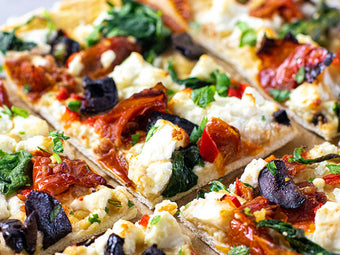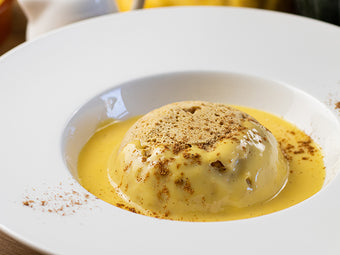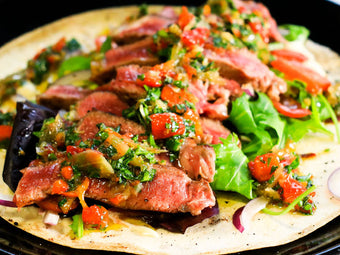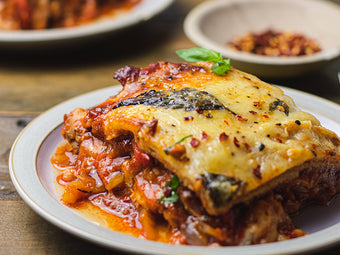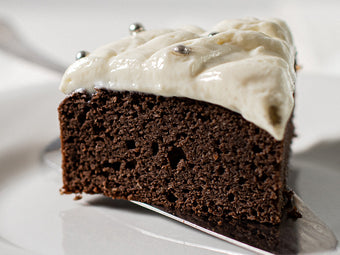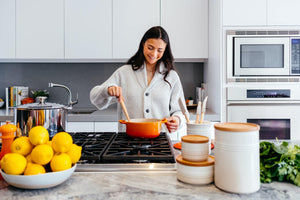Knife Skills 101
Improving Your Kitchen Skills Will Make Your Cooking Quicker, More Creative & More Fun
As the chef here at Lo-Dough, I can often take it for granted that cooking is quick, easy, fun and (the occasional disaster aside... it happens to all of us) always results in something delicious to eat.
From basic knife skills to a broader understanding of key ingredients, there is a huge potential for improvement in home cooking. For example, a recent UK survey has shown that only 50% of its participants felt confident that they could cook a steak accurately to their liking and one in four people claim they can only cook 3 recipes!
In fact, there has been a more general 54% decline in home cooking over the last 30 years. If you are on any kind of diet, the ability to prepare your own simple, healthy and delicious meals is paramount to the diet's success.
Knife Skills 101
Better-prepared ingredients cook more evenly and will be better distributed throughout the dish you are making, actually making your food taste better. Being able to work speedily through a bit of ingredient preparation will also increase your desire to cook - this part of cooking shouldn't feel like a chore. Not only that, but your food will look more impressive and you will work in a far safer fashion.
Choosing/sharpening a knife
The knife you use is somewhat important. That said, it isn't necessary for a home cook to go out and spend hundreds of pounds on a perfectly crafted piece of Japanese steel (though this really would be a once or twice in a lifetime purchase). By the same token, if you are paying £5 for a pack of three knives in a supermarket, you are buying into a false economy - they will feel poorly weighted, damage easily and be difficult to keep sharp. For good knife skills, a sharp knife is absolutely key.

The main, all-purpose knife I use at Lo-Dough cost me £20 (discounted from £50) at a branch of TK Maxx. It is nice and weighty and the blade is approx 18cm long. I use it for most jobs in the kitchen here at work. For an extra £10, I was able to buy a sharpener (known as a 'steel') too. I bought these in March 2018 and my knife here at Lo-Dough HQ is as sharp today as it ever was. A well-chosen, one-off purchase like this will serve you well for a long time to come.
Sharpening should really be done every time you use the knife. This is for two reasons: Firstly, it makes chopping anything far easier and secondly, you are actually less likely to cut yourself with a sharper knife. A sharp knife will do most of the work for you. When you are adding weight or pressure with a blunt knife, you are far more likely to slip and potentially hurt yourself. Sharpening a knife takes seconds and will save you time (and pain!) in the long run.
Slicing & dicing vegetables
We're going to make a big pot of soup. It's going to be delicious and worth making just for that (Btw - Lo-Dough Garlic Bread goes great with most soups!), but the real point of this soup is to get you practising your knife skills. It's all going to get blitzed at the end anyway, so any mistakes you make on the way won't matter and none of this food will go to waste.
Get yourself a bag of onions, a bulb of garlic and a stack of any root veg of your choice (carrots, potatoes, sweet potatoes, squashes, swede, celeriac). You'll also need stock cubes/pots and cream or creme fraiche.
Let's start with the onion - finely sliced and finely chopped (diced). Go slowly at first and build up a little speed as you gain confidence. Remember to sharpen your knife, keep all fingers (and thumbs!) tucked away at all times and to let the knife do the lion's share of the work. The hand holding the vegetable should look almost 'claw' like.
First, chop the onion in half and peel away the outer skin, leaving the root on. Next make slices across the onion, almost, but not quite to the end. Make more slices in the opposite direction for perfectly chopped onions.
Next up, the garlic - finely chopping and pureeing. Bash the garlic to loosen the skin, then chop carefully - always being mindful to keep your fingers out of the way. To turn it into a puree, add a little coarse salt over the garlic and press down and scrape with the side of your knife.
Next, chopping root veg - julienne (match sticks) and brunoise (fine dice). Again, don't go too fast until you've gained the confidence that your fingers are always out of the way.
Finally, chopping herbs - roughly and finely chopped. For this, you will end up using the cross-chopping technique, where you hold one hand over the knife and rock it back and forth across the herbs.
By now, you should have a big pile of chopped and sliced veg (you won't need all the onions and garlic for this soup - freeze some of them in a bag for future recipes). Add some oil to a pan, and gently sweat off all the veg off for around 5-10 minutes. Add a stock cube or two, plus water to cover and cook for approx. ten minutes (no more - your finely chopped veg will cook very quickly). Blend with a stick blender or in a liquidiser, add the cream/cream fraiche and finely chopped herbs, check for seasoning (salt, pepper, a squeeze of lemon) - adjusting if necessary and then serve. Portion and freeze for quick and easy meal options in the weeks to come.
This simple recipe can be adapted for any number of soups - carrot and coriander, leek and potato, velvety butternut squash. Try to make a few of them in the upcoming weeks, trying to gradually speed up your chopping each time. Soups are cheap, quick, healthy, delicious and with each one, you will see your knife skills improve with the practice.
As ever, don't forget to serve them with Lo-Dough on the side to keep the calories and carbs right down and the fibre up!









